Live on the homepage now!
Reader Supported News
Trump is a would-be dictator, as his attempt to derail the 2020 election results and his whipping up of the Jan. 6 Capitol Insurrection demonstrates. That is, he wanted to do to the US Constitution what he did to Ms. Carroll.
Trump can be depended on to fund-raise on his conviction, and the scarily irrational MAGA base will ignore it.
Chris Licht’s right-leaning CNN has even thrown caution to the winds and offered to televise a Trump “town hall” in prime time. Licht came to CNN from entertainment television in part — having been a show-runner on Stephen Colbert’s Late Show, and in entertainment TV it is thought unwise to alienate half your audience by taking partisan political stands. We saw Taylor Swift warned by her handlers about losing 50% of her concert attendees over opposing Sen. Marsha Blackburn. That’s how they think in show biz. It is why there are no union member characters on American television shows. (Ironically, Colbert himself rejects this warped logic and has had great success nevertheless.)
So Licht applied the same yardstick to CNN, and made the anchors stop calling Jan. 6 an insurrection and stopped them from referring to the phony conspiracy theory Trump put about that the 2020 election was rigged as “the big lie.”
And now he’s bringing Trump into America’s living rooms unfiltered. If the American Republic goes the way of the Roman, it will be enablers like Licht who are to blame.
In contrast, the US media never had anything good to say about other dictators who were serial sex abusers. Take Libyan strongman Moammar Gaddafi. He was renowned for having a female personal guard. But guess what? Five of them alleged that he had raped them. Gaddafi, like Trump, was a monster.
Too bad his own people overthrew and killed him, or Chris Licht could give Gaddafi a live town hall on CNN, too.
Or there was Italian fascist dictator Benito Mussolini, whose minions killed tens of thousands of Allied soldiers. He is admired in Trumpian circles — Trump consigliere Steve Bannon slavers over Il Duce as a role model. Mussolini, too, was a vicious rapist, according to Yale University Press author RJB Bosworth.
One of Mussolini’s letters is quoted in that book describing his assault on a young virgin: “I grabbed her on the stairs, threw her into a corner behind a door and made her mine. She got up weeping and humiliated, and through her tears she insulted me.”
Creep.
Or there is the ex-dictator of Gambia in West Africa, Yahya Jammeh, who “handpicked” women for rape during his 22-year reign of terror. After it was over he tried to bribe them with gifts.
Rapist dictators are a dime a dozen. Trujillo of the Dominican Republic. Hissene Habre of Chad.
Trump now formally joins their ranks, having at last been publicly found liable for just one of his many alleged assaults on women (some of them, again allegedly, having been minors). Ugh.
And many Americans would blithely put this ogre back in the highest office of the land.
US politicians are always going on about how things happen abroad that just wouldn’t be tolerated in a “civilized society.”
But it turns out, not so much. We, like the Chadians, Gambians, Libyans and Dominicans, have had a sexual predator-president who sought to be president for life.
Maybe that conceit of being a “civilized society” so different from others is unwarranted. Or maybe the phrase has a genuine content and we just don’t fit that bill.
READ MORE 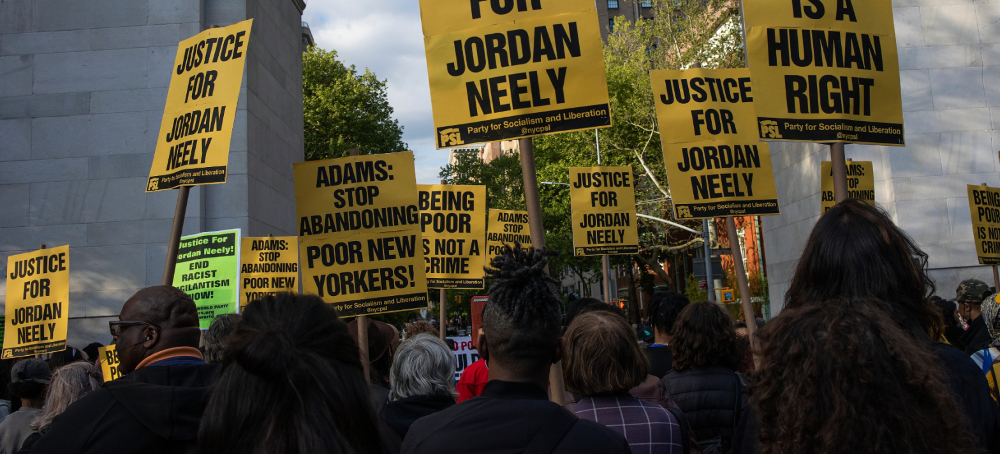 Protest for the death of Jordan Neely, May 5, 2023, in Washington Square Park, New York City, New York. (photo: Andrew Lichtenstein/AFP)
Protest for the death of Jordan Neely, May 5, 2023, in Washington Square Park, New York City, New York. (photo: Andrew Lichtenstein/AFP)
Penny is expected to be arraigned Friday
On Thursday, the Manhattan District Attorney Alvin Bragg announced the charges against Penny and said he was hopeful for the surrender. “We can confirm that Daniel Penny will be arrested on a charge of Manslaughter in the Second Degree,” a spokesperson for Bragg said. “We cannot provide any additional information until he has been arraigned in Manhattan Criminal Court, which we expect to take place tomorrow.”
Before the charges were officially confirmed, Penny retained criminal defense attorneys Thomas Kenniff and Steven Raiser. On Thursday, in a statement to Rolling Stone, the firm wrote, “We are confident that once all the facts and circumstances surrounding this tragic incident are brought to bear, Mr. Penny will be fully absolved of any wrongdoing.”
It took prosecutors eleven days to charge Penny, who killed Neely after putting him in a fatal chokehold on May 1. Neely, who was unhoused and seemingly having a mental health crisis, was reportedly yelling and acting erratically on a subway car when Penny put him in the chokehold. An independent journalist captured part of the incident on video and later said Neely had not assaulted anyone before Penny put him in the chokehold for approximately 15 minutes.
After the incident, police told reporters that they took Penny (who hadn’t been identified yet) into custody, questioned him, and released him. A few days after Neely’s death, on May 4, the medical examiner determined that Neely died of compression to his neck caused by the chokehold, ruling his death a homicide.
Attorneys Kenniff and Raiser released a statement on Penny’s behalf last Friday, May 5, accusing Neely of having a “documented history of violent and erratic behavior,” and claiming he was “aggressively threatening Daniel Penny and the other passengers” on the subway.
The Neely family, through its lawyers, responded Monday, May 8, calling Penny’s statement neither “an apology nor an expression of regret,” but a “character assassination.” The lawyers also called out the way Penny’s statement “suggests that the general public has shown ‘indifference’ for people like Jordan.” But, they say, “that term is more appropriately used to describe [Penny].”
READ MORE 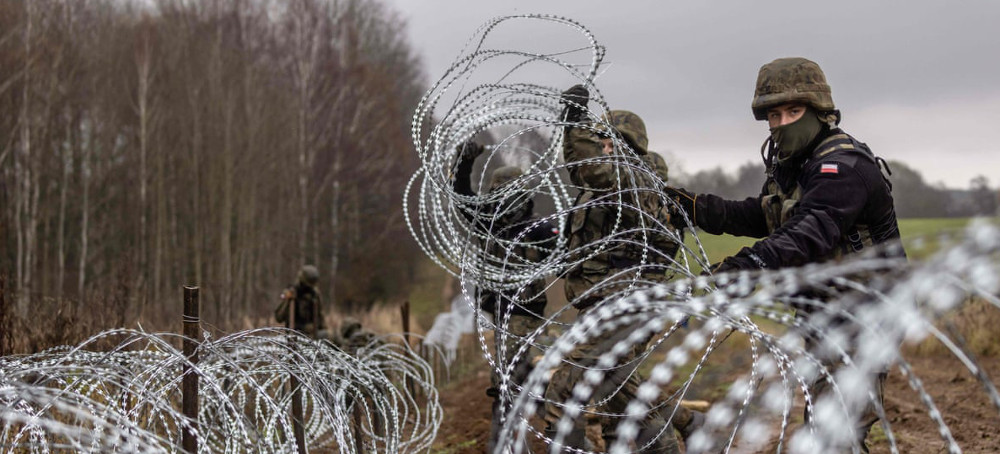 Polish soldiers build a concertina fence on the border with Russia. Kaliningrad sits in an exclave sandwiched between Lithuania and Poland on the Baltic coast. (photo: AFP)
Polish soldiers build a concertina fence on the border with Russia. Kaliningrad sits in an exclave sandwiched between Lithuania and Poland on the Baltic coast. (photo: AFP)
Russian city will now be known as Królewiec in official documents, its name in the 15th and 16th centuries
Kaliningrad, which sits in an exclave sandwiched between Lithuania and Poland on the Baltic coast, was known by the German name of Königsberg until after the second world war, when it was annexed by the Soviet Union and renamed to honour politician Mikhail Kalinin.
On Wednesday, Poland’s development minister, Waldemar Buda, said Kaliningrad would now officially be called Królewiec, its name when it was ruled by the Kingdom of Poland in the 15th and 16th centuries.
“We do not want Russification in Poland and that is why we have decided to change the name in our native language of Kaliningrad and the Kaliningrad region,” Buda said, citing a recommendation by a state commission tasked with standardising foreign names in the Polish language.
Warsaw says Kalinin’s connection to the 1940 Katyn massacre
– when thousands of Polish officers were executed by Soviet forces – had negative connotations.
“The current Russian name of this city is an artificial baptism unrelated to either the city or the region,” Poland’s committee on geographical standardisation said on Tuesday.
Kremlin spokesperson Dmitry Peskov said the decision “bordered on madness”.
“We know that throughout history Poland has slipped from time to time into this madness of hatred towards Russians,” he told a briefing.
Kaliningrad was cut off from Moscow when Lithuania became independent during the breakup of the Soviet Union in 1991.
In the city itself, people were split over the Polish move.
“[This land] is conquered by us, by my ancestors … this is our territory and there can be no Królewiec whatsoever,” said an elderly man who did not give his name.
Others appeared to be less upset. One woman noted Lithuania had also renamed the city Królewiec.
“Nothing would change … apart from need to change all their documents. If they want it, let them do it,” she said.
Relations between Poland and Russia have often been strained.
Moscow says it liberated Poland when its forces drove out Nazi forces at the end of the war. Most Poles believe the Soviet Union replaced Nazi occupation with another form of repression.
Poland, a Nato member, strongly backed Ukraine after Russia’s invasion, and has stepped up the demolition of memorials to fallen Soviet troops across the country.
READ MORE Using mRNA tailored to each patient's tumor, the vaccine may have staved off the return of one of the deadliest forms of cancer. (photo: iStock)
Using mRNA tailored to each patient's tumor, the vaccine may have staved off the return of one of the deadliest forms of cancer. (photo: iStock)
Using mRNA tailored to each patient’s tumor, the vaccine may have staved off the return of one of the deadliest forms of cancer in half of those who received it.
The vaccine might not stop those relapses, some of the scientists figured. But patients were desperate. And the speed with which the disease, pancreatic cancer, often recurred could work to the scientists’ advantage: For better or worse, they would find out soon whether the vaccine helped.
On Wednesday, the scientists reported results that defied the long odds. The vaccine provoked an immune response in half of the patients treated, and those people showed no relapse of their cancer during the course of the study, a finding that outside experts described as extremely promising.
READ MORE 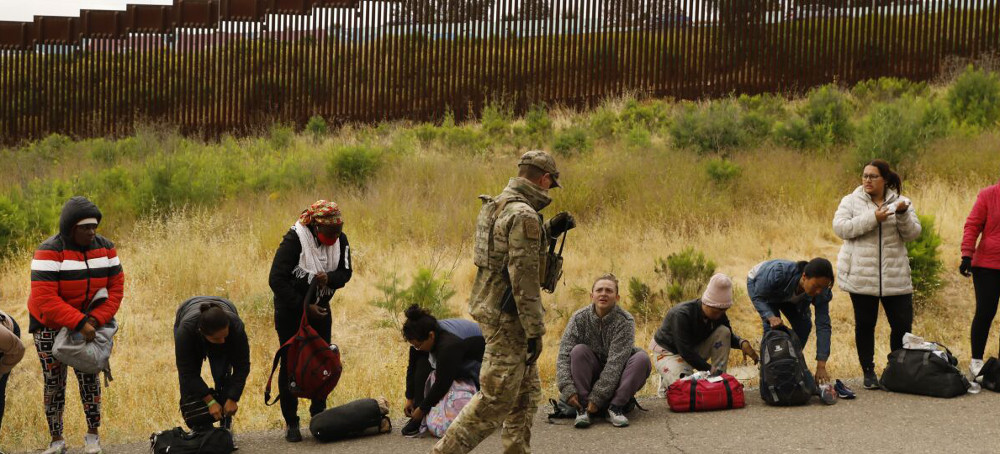 U.S. border patrol agents process a group of 30 migrants who have been waiting to cross into the United States from Tijuana, May 11, 2023. (photo: Carolyn Cole/LA Times)
U.S. border patrol agents process a group of 30 migrants who have been waiting to cross into the United States from Tijuana, May 11, 2023. (photo: Carolyn Cole/LA Times)
The policy, which is set to take effect late Thursday, limits asylum from migrants who cross through a third country on the way to the U.S. and do not seek protections on the way to the southern border.
The ACLU, along with the UC Hastings Center for Gender and Refugee Studies, and the National Immigrant Justice Center, wrote in the filing that the new policy was unlawful.
“After campaigning on a promise to restore our asylum system, the Biden Administration has instead doubled down on its predecessor’s cruel asylum restrictions,” the lawsuit reads. “The agencies claim the Rule merely provides consequences for asylum seekers circumventing lawful pathways. But seeking asylum is a lawful pathway protected by our laws regardless of how one enters the country.”
The Trump administration previously attempted to bar asylum for migrants who crossed into the U.S. without authorization and did not seek protections in another country on their journey, but the policy was blocked in federal court. The Supreme Court later stayed the order. The groups said the new policy resembles past Trump asylum bans.
“The Rule operates just as the Trump administration’s prior asylum bans did: Asylum seekers subject to the Rule — all non-Mexicans — are categorically barred unless they satisfy one of the enumerated and limited conditions or exceptions,” the lawsuit read. “That’s a simple ban with narrow exemptions, and it turns the asylum process on its head.”
It is one of the main efforts the Biden administration has set up to handle the increase in migrants at the U.S.-Mexico border after the Thursday night expiration of Title 42, a policy implemented by the Trump administration at the start of the COVID-19 pandemic.
A DHS spokesperson said in a statement that the administration had “led the largest expansion of lawful pathways in decades.”
“This rule seeks to incentivize migrants to use lawful pathways instead of taking the dangerous journey to unlawfully cross the southern border,” the statement read. “This rule responds to the elevated encounters we are experiencing at the border and is critical to creating an orderly process to seek protection in the United States at a time when Congress refuses to reform our broken immigration laws or provide the necessary funds to hire sufficient asylum officers and immigration judges to process claims in a timely manner.”
The Biden administration is also facing lawsuits from those on the right, including in Florida, where a federal judge blocked the Biden administration on Thursday from quickly releasing migrants from Border Patrol custody without court notices. The lawsuit was brought by the Florida attorney general’s office.
In the lead-up to the end of Title 42, there has been an increase in migration at the southern border. On Tuesday, border agents apprehended more than 10,000 migrants, according to internal data obtained by The Times. U.S. Customs and Border Protection had more than 28,000 migrants in custody as of Wednesday, the data showed.
Attorneys for the federal government urged the court to not block the administration’s recent effort to relieve facilities by releasing migrants without a court notice but directing them to check in with an Immigration and Customs Enforcement office. The memo, signed Wednesday by Border Patrol Chief Raul Ortiz, allowed officials to release migrants from their facilities if there were an average of 7,000 arrests a day over a three-day period along the border, or if facilities were over a certain level of capacity.
The government warned that without that power, or other efforts, there would be even higher levels of crowding in government custody.
“At the current operational pace, and without any additional measures such as Parole with Conditions, USBP would have over 45,000 individuals in custody by the end of the month. Further, the [U.S. Department of Homeland Security] Chief Medical Officer has concluded that ‘current conditions pose an increased risk of adverse health outcomes,’” the filing from the Department of Justice lawyers read.
Judge T. Kent Wetherell, who was appointed to the district court by former President Trump, issued the temporary restraining order. It will be in place for two weeks.
“This is a harmful ruling that will result in unsafe overcrowding at CBP facilities and undercut our ability to efficiently process and remove migrants, and risks creating dangerous conditions for Border Patrol agents and migrants,” said a U.S. Customs and Border Protection statement released in response to the order.
The Biden administration is encouraging migrants to seek appointments at ports of entry to enter the U.S. and seek asylum, as well as to apply for a program that allows migrants from Cuba, Venezuela, Haiti and Nicaragua the chance to enter the country if they have a financial sponsor and can pass security checks.
READ MORE 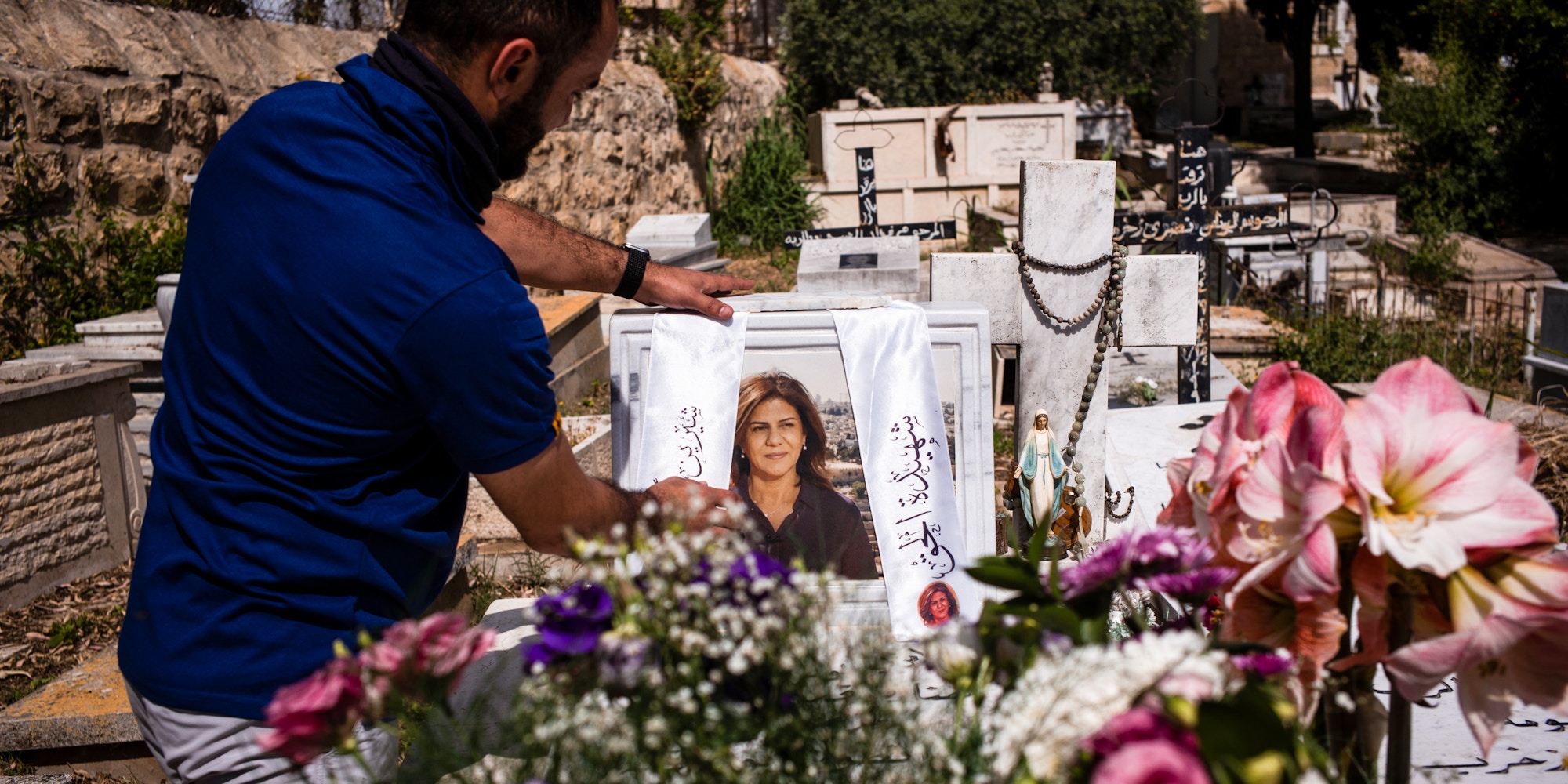 Flowers and tributes adorn the grave of Al Jazeera journalist Shireen Abu Akleh, killed by Israeli forces one year ago, May 7, 2023, in Jerusalem. (photo: Ilia Yefimovich/Picture Alliance)
Flowers and tributes adorn the grave of Al Jazeera journalist Shireen Abu Akleh, killed by Israeli forces one year ago, May 7, 2023, in Jerusalem. (photo: Ilia Yefimovich/Picture Alliance)
A year after Israel killed the Palestinian American journalist, an FBI probe remains pending, yet the U.S. has gone silent on her death.
This week marks one year since an Israeli soldier killed the Palestinian American journalist with a single shot to the head while she was reporting from the city of Jenin. For her former colleagues, her absence is as dominating as her presence once was.
“She was a legend,” Rania Zabaneh, an Al Jazeera producer and friend of Abu Akleh told The Intercept during a visit to the office earlier this year. Abu Akleh was universally loved among her peers and a household name across the Middle East. While she spent her career covering the daily tragedies of Palestinian life under Israeli occupation, her co-workers remember her as funny and upbeat, always seeking out stories about joy and resilience. “She dug for fun, happy stories in a place where everything else is dark,” said Zabaneh.
Over the last year, Abu Akleh’s colleagues have continued to report on Israeli violence across occupied Palestine, including increasingly frequent military invasions of West Bank cities like the one she was covering the day she was killed. They have also found themselves at the center of the story: regularly updating the public about the various probes into their colleague’s death while actively participating in global calls for justice.
No one has been held accountable for Abu Akleh’s killing to date. While Israeli officials quickly closed the case, declining to bring charges, the most significant movement has so far come from the United States. Last fall, the FBI launched an investigation last fall following a sustained public pressure campaign, including by members of Congress; that probe is ongoing. Meanwhile, the Office of the U.S. Security Coordinator for Israel and the Palestinian Territories, the liaison on security issues in the region, has delayed issuing its own report into the killing.
Along with Abu Akleh’s family, Al Jazeera has filed a formal request to investigate the killing to the International Criminal Court, whose probe into an array of alleged crimes committed in Palestine has not made much progress since it was launched in 2021.
As those probes stall, many of Abu Akleh’s colleagues still struggle to cope with the void she left.
“At first, we were on autopilot; we were like, she’s gone and we have to cover her killing,” said Zabaneh. “But it’s getting harder as time passes, because now we have to come to terms with the fact that she’s not coming back; she’s gone, gone.”
No Accountability
When Abu Akleh was shot on May 11, 2022, she was wearing a clearly marked press vest in an area with no active fighting between Israeli forces and Palestinian fighters. (Israel initially claimed that she was killed at the scene of a firefight, a claim that was quickly debunked.) In the weeks following her killing, half a dozen independent reviews, including one by the United Nations, found that Israeli forces were responsible. Last July, Palestinian human rights group Al-Haq and the U.K.-based research agency Forensic Architecture released a detailed reconstruction of the shooting, which concluded that Abu Akleh had been deliberately targeted.
While the killing sparked significant international condemnation, it was hardly an isolated incident.
Last year was the deadliest for Palestinians in the West Bank since the end of the Second Intifada in the early 2000s. This year is on track to be worse, as Israeli forces make military incursions into cities like Nablus and Jenin with increasing frequency. According to the U.N., Israeli forces have already killed at least 94 Palestinians this year, including at least 19 children, more than double last year’s number in the same period.
Israeli soldiers killing Palestinians almost never face consequences. And there also hasn’t been any accountability when they have killed citizens of other countries, including several Americans. As The Intercept reported last year, the U.S government never investigated Israel’s killing of 23-year-old peace activist Rachel Corrie, who was crushed to death with a bulldozer while protesting a home demolition in Gaza 20 years ago, nor of 78-year-old Omar Assad, a former Milwaukee grocery store owner who died of a heart attack last year while in the custody of a notoriously violent Israeli military unit.
The Justice Department’s investigation into Abu Akleh’s death, which came only after serious outrage at U.S. inaction in the case, marked the first time the U.S. government moved to independently probe Israel’s killing of an American. As standard with criminal investigations by the FBI, Justice Department officials have not spoken publicly about the case. The Justice Department did not respond to a request for comment.
Last July, the USSC, the U.S. security coordinator in the region, issued a cursory statement on the killing that sparked widespread condemnation and questions about the office’s independence. Since then, the coordinator has launched a new review of the killing, which has included a meeting with members of Forensic Architecture and Al-Haq earlier this year.
Following a formal request by Sens. Bob Menendez and Cory Booker, the security coordinator was expected to provide a classified congressional briefing on his office’s investigation of the case. That never happened, and a report by the coordinator, which was expected to be released earlier this year, has also been delayed. During a press briefing last week, State Department spokesperson Vedant Patel said that the USSC “has not changed” the conclusions it had reached last summer, “which is that [Israeli Defense Forces] gunfire was likely the reason, unintentionally.”
In a letter published last week, Sen. Chris Van Hollen, who has consistently raised Abu Akleh’s case, criticized the delay and reiterated a request for the report to be released. “Most recently, we were informed that, before congressional release of the USSC Report is authorized, the Administration plans to make unspecified changes to its contents,” Van Hollen noted. “While the Administration has characterized its proposed changes as ‘technical,’ any actions to alter the USSC’s Summation Report in any way would violate the integrity of this process.”
The State Department declined to comment on government communications about the report. “We are determined to prevent similar tragedies from occurring in the future and continue to engage with Israel in this regard,” Patel wrote in an email.
A Chilling Effect
Abu Akleh was not the first journalist killed by Israeli forces. In a report published this week, the Committee to Protect Journalists, or CPJ, documented at least 20 instances of Israeli Defense Forces killing members of the media since 2001.
Like Abu Akleh, the majority of those killed — at least 13 — were clearly identified as journalists or inside vehicles with press insignia when they were killed, according to the report. Many more journalists were injured by Israeli forces, which also repeatedly targeted media headquarters. During a military assault on Gaza in 2021, for instance, Israel bombed buildings where more than a dozen local and international media outlets were headquartered, including The Associated Press and Al Jazeera. As The Intercept has previously reported, Israel also regularly detains and questions Palestinian journalists, including 16 who are currently being held without charges.
“To be a journalist in Palestine is a very dangerous job,” said Ammar Al Dwaik, the director of the Independent Commission for Human Rights, Palestine’s national human rights institute, adding that journalists also face daily intimidation by settlers and soldiers.
Al Dwaik, who was a friend of Abu Akleh, said that her killing was a reminder that nobody was safe from Israeli violence, and that journalists were no exception. “Shireen was visible, in the broad daylight. Soldiers could see her wearing the vest and yet they shot her, which means that no one is safe and everyone could be a target,” he said. “Being a journalist doesn’t give you any protection with Israeli soldiers.”
Nor has being a clearly identifiable journalist led to greater accountability. “The degree to which Israel claims to investigate journalist killings depends largely on external pressure,” Sherif Mansour, CPJ’s Middle East and North Africa program coordinator, wrote in a statement. “There are cursory probes into the deaths of journalists with foreign passports, but that is rarely the case for slain Palestinian reporters. Ultimately, none has seen any semblance of justice.”
In its report, CPJ warned that Israeli violence against journalists has a “chilling effect” that undermines press freedom. That chilling effect, some Palestinian journalists told The Intercept, comes not just in the form of fear but also of a lost sense of purpose and the impression that their lives are considered unworthy.
Those feelings intensified after Abu Akleh was killed. A few days after the shooting, Zabaneh was with a team who traveled to Jenin, to report on Israel’s incursion into the city’s refugee camp. As they parked on the camp’s outskirts, the group of seasoned journalists froze, unsure of what to do. “We were like, do we go in? We got stuck there for 10 minutes before deciding,” said Zabaneh. “We’re not talking about a bunch of rookies. … Everybody’s coming in with at least 10 years of experience. It was like, what do we do now?”
Dalia Hatuqa, a freelance Palestinian American journalist who has written for The Intercept and was a friend of Abu Akleh, echoed those sentiments. “Fear has permeated our work.”
In February, when Israeli settlers invaded the city of Hawara, outside Nablus, setting fire to homes and cars in the most severe episode of settler violence in years, Hatuqa hesitated before deciding not to go cover the news as she would have in the past. “It was a combination of fear, but also of, ‘What’s the point?’” she said. “The whole thing has had a depressive effect on our ability to work.”
Despite the lack of accountability, many members of both the U.S. government and the U.S. media seemed to have moved on, lamented Hatuqa. She noted that at the White House Correspondents’ Association dinner last week, President Joe Biden spoke of journalists Austin Tice, who has been missing in Syria since 2012, and Evan Gershkovich, the Wall Street Journal reporter detained in Russia. Biden made no mention of Abu Akleh. Neither did Secretary of State Anthony Blinken, at a recent event commemorating World Press Freedom Day.
“It’s almost like, it happened, let’s all move on,” Hatuqa said. “But some of us haven’t moved on at all.”
READ MORE 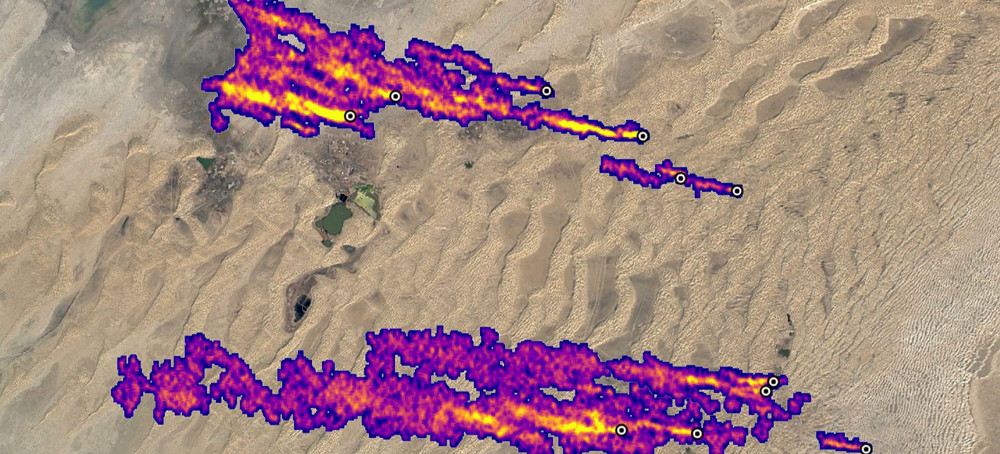 East of Hazar, Turkmenistan, a port city on the Caspian Sea, 12 plumes of methane stream westward. (photo: NASA)
East of Hazar, Turkmenistan, a port city on the Caspian Sea, 12 plumes of methane stream westward. (photo: NASA)
Experts say leaks of the potent greenhouse gas could be easily fixed, and would rapidly reduce global heating.
Emissions of the potent greenhouse gas from the oil- and gas-rich country are “mind-boggling,” and an “infuriating” problem that should be easy to fix, experts have told the Guardian.
The data produced by Kayrros for the Guardian found that the western fossil fuel field in Turkmenistan, on the Caspian coast, leaked 2.6 million tons of methane in 2022. The eastern field emitted 1.8 million tons. Together, the two fields released emissions equivalent to 366 million tons of carbon dioxide, more than the UK’s annual emissions, which are the 17th-biggest in the world.
Methane emissions have surged alarmingly since 2007 and this acceleration may be the biggest threat to keeping below 1.5 degrees Celsius of global heating, according to scientists. It also seriously risks triggering catastrophic climate tipping points, researchers say.
The Guardian recently revealed that Turkmenistan was the worst in the world for methane “super emitting” leaks. Separate research suggests a switch from the flaring of methane to venting may be behind some of these vast outpourings.
Flaring is used to burn unwanted gas, putting CO2 into the atmosphere, but is easy to detect and has been increasingly frowned upon in recent years. Venting simply releases the invisible methane into the air unburned, which, until recent developments in satellite technology, had been hard to detect. Methane traps 80 times more heat than CO2 over 20 years, making venting far worse for the climate.
Experts told the Guardian that the COP28 UN climate summit being hosted in the United Arab Emirates in December was an opportunity to drive methane-cutting action in Turkmenistan. The two petrostates have close ties and there is pressure on the UAE to dispel doubts that a big oil and gas producer can deliver strong outcomes from the summit.
Tackling leaks from fossil fuel sites is the fastest and cheapest way to slash methane emissions, and therefore global heating. Action to stem leaks often pays for itself, as the gas captured can be sold. But the maintenance of infrastructure in Turkmenistan is very poor, according to experts.
‘Out of control’
“Methane is responsible for almost half of short-term [climate] warming and has absolutely not been managed up to now – it was completely out of control,” said Antoine Rostand, the president of Kayrros.
“We know where the super emitters are and who is doing it,” he said. “We just need the policymakers and investors to do their job, which is to crack down on methane emissions. There is no comparable action in terms of [reducing] short-term climate impacts.”
Super-emissions from oil and gas installations were readily ended, Rostand said, by fixing valves or pipes or, at the very least, relighting flares: “It’s very simple to do, it has no cost for the citizen, and for the producers, the cost is completely marginal.”
The satellite data used by Kayrros to detect methane has been collected since the start of 2019 and Turkmenistan’s overall emissions show a level trend since then. Satellites have also detected 840 super-emitting events, ie leaks from single wells, tanks or pipes at a rate of a few tons an hour or more, the most from any nation.
Most of the facilities leaking the methane were owned by Turkmenoil, the national oil company, Kayrros said. Further undetected methane emissions will be coming from Turkmenistan’s offshore oil and gas installations in the Caspian Sea, but the ability of satellites to measure methane leaks over water is still being developed.
Kayrros also did some high-resolution monitoring of the North Bugdayly field in western Turkmenistan. The number of super-emitter events there doubled to almost 60 between 2021 and 2022, with one recent super-emitter pouring out methane for almost six weeks.
Turkmenistan is China’s second biggest supplier of gas, after Australia, and is planning to double its exports to the country. Until 2018, Turkmen citizens had received free gas and electricity. However, the country is also very vulnerable to the impacts of the climate crisis, with the likelihood of severe drought projected to increase “very significantly” over the 21st century and yields of major crops expected to fall.
‘Huge opportunity’
Speaking freely about the repressive and authoritarian state is difficult but sources told the Guardian it was a “very depressing” situation, with Turkmenistan probably the worst country in the world in dealing with methane leaks.
They said preventing or fixing the leaks represented a “huge opportunity” but that the lack of action was “infuriating.” Turkmenistan could stop the leaks from aging Soviet-era equipment and practices, they said, and the country could be the “world’s biggest methane reducer.” But the huge gas resources on tap meant “they never cared if it leaked.”
It was also not a priority for the president, Serdar Berdimuhamedov, they said, without whose approval little happens. This is despite Berdimuhamedov, then deputy chair of the cabinet of ministers, telling the UN climate summit COP26 in Glasgow in 2021 that Turkmenistan was reducing greenhouse gas emissions “by introducing modern technologies in all spheres of the state’s economy,” with “special attention” to the reduction of methane emissions.
Berdimuhamedov also welcomed the Global Methane Pledge (GMP) to cut emissions, but Turkmenistan has failed to join the 150 nations now signed. Neither are Turkmenoil and Turkengas, the state companies, members of a voluntary UN initiative to cut leaks, the Oil and Gas Methane Partnership 2.0 (OGMP2), which covers about 40 percent of global oil and gas production. “The president hasn’t followed up,” said a source.
Largest hotspot
Recent scientific research, published in the journal Environmental Science and Technology, found that the west coast of Turkmenistan was “one of the largest methane hotspots in the world”.
Detailed analysis of satellite data revealed 29 different super-emitter events between 2017 and 2020, although older satellite data showed that “this type of emission has been occurring for decades.”
The researchers said 24 of the 29 super-emitter events came from flare stacks that had been extinguished and were then venting methane directly into the air, and that all were managed by state companies. The other five were linked to pipeline leaks. The scientists said that “the more frequent emitters would conflict with Turkmen law, which bans continuous gas flaring and venting.”
“Flaring is very easy to identify from the flame itself,” said Itziar Irakulis-Loitxate, of the Universitat Politècnica de València in Spain, who led the study. “But venting was something that you could not identify easily until two years ago.” The switch to venting, a far worse environmental practice, was “mind-boggling,” according to another expert.
The scientists said the prevalence of venting “points to the risks of penalizing flaring without effective measures to control venting.” The World Bank founded a global initiative to end flaring in 2015.
‘Forcing mechanism’
The UN climate summit in December represented an opportunity for change, sources said, as it is being hosted by the UAE, which has strong links with Turkmenistan and expertise in oil and gas production. The most recent visit by Sheikh Mansour bin Zayed, the UAE’s deputy prime minister, to Turkmenistan was in February. He met Berdimuhamedov and discussed with him bilateral cooperation “in vital sectors such as oil and gas.”
The UAE is a member of the Global Methane Pledge and the state oil company, Adnoc, is a member of the OGMP2. Adnoc recently announced a partnership to develop a “supergiant gas field” called Galkynysh and other energy projects in Turkmenistan. However, Adnoc did not respond to a request for information on how the company would help limit methane emissions in the country.
The Guardian understands diplomatic efforts are being made to urge Turkmenistan to cut its methane emissions. “We are really hoping COP28 is a forcing mechanism,” a source said.
The Guardian contacted Turkmenoil, Turkmengaz, the Turkmenistan ministry of foreign affairs and the Turkmen embassy in the UK for comment, but none responded.
Follow us on facebook and twitter!
PO Box 2043 / Citrus Heights, CA 95611

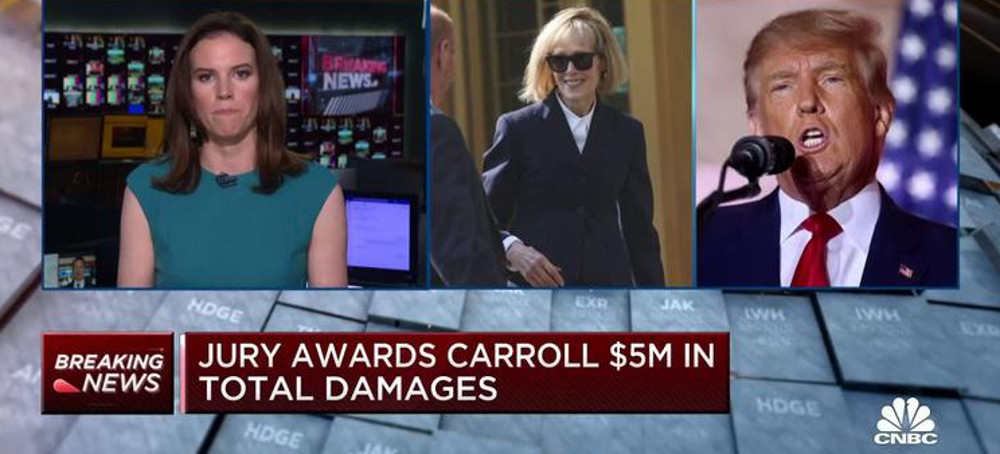

No comments:
Post a Comment
Note: Only a member of this blog may post a comment.